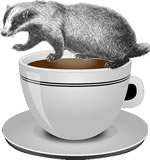
Yesterday I discovered that the Italian word for cup, tazza, is rather similar and possibly confusable with the word for badger, tasso, which can also mean a rate (of exchange) or a yew (tree).
It’s unlikely that if you mistakenly ask for un tasso di tè rather than una tazza di tè, you will be given a badger of tea, but it would be an easy mistake to make, especially if you know the French word for cup, tasse, or the Spanish taza, or the German Tasse, which comes from the French, which comes from the Arabic طاس (ṭās – die; bowl), from the Persian تاس (tās – die/dice).
I also discovered the wonderful word owlful, which means full of badgers, or possibly full of owls. How awful it must be to be owlful! It’s a word that should have appeared in the Harry Potter books, which are brimful of owls at points, and slightly, though not entirely, badgerless.
The Harry Potter books are definitely not badgerless, the symbol of Hufflepuff House is a badger.
Ah now I realize why we call it (in our dialect) [طاسة] tásah. But here it’s not a cup, but the saucer or a dish.
Probably Arabic writers did use this word in their early writing, specifically late medieval times. However, nowadays, in the standard Arabic, the word is Sahn [صحن].
Also just to note, in our dialect we use both of the words above in fact, but maybe the latter is used more to refer to eating dishes and not cups.
Just to note: the Persian transliteration in the article is the same as the Arabic one, but the “t” should be dotless.
I have some hard time typing unusual letters here (I have to run Charmap to pick up special characters from the chart). I’m posting this in a hurry thus I Didn’t put any IPA above.
” tazza … similar and possibly confusable with the word for badger, tasso …”
If I didn’t know any French or German, I don’t think I would be likely to confuse them, as an Italian learner. But knowing that the French and German both have ‘ss’ makes confusion far more likely.
Is the coffee brand Ritazza a play on words, then?
The Welsh for ‘cup’ is cwpan. But when referring to a cup of something, it’s cwpaned, which is usually shortened to paned. Paned, on it’s own, is thus usually understood to mean ‘a cup of tea’ (like cuppa in colloquial English), unless otherwise specified.
Common Welsh names for the badger are broch and mochyn daear (=’earth pig’), so little risk of confusion with a cuppa.
Serbian word: тацна (pronounced tatzna) sounds similar, but it’s the word the small plate thingo you put beneath the cup itself.
Italian “tasso” (=badger) is a Germanic loan word which in English is represented in the word “Dachshund” or ‘sausage dog’ it’s the ‘Dachs’ element that is the German word for ‘badger’ Dachshund is ‘badger dog’
German ‘Dachs’ derives from a Proto-Germanic *þahsuz which in turn is from the Proto-Indo-European root *teḱs- cognate with Latin texō (“weave, braid, build, compose”)
Other Romance languages have ended up with the same ‘badger’ Germanic loan word evolution.
Old French taisson,
Spanish texon, tejon
Catalan toixó, teixó comú
Portuguese texugo
Romansch tais
Regional variant Welsh words for ‘badger’ are: pry/f llwyd, mochyn gwyllt, mochyn bychan, mochyn y coed
“Regional variant Welsh words for ‘badger’ are: pry/f llwyd, mochyn gwyllt, mochyn bychan, mochyn y coed”
Most of these make sense to me (‘wild pig’, ‘little pig’, ‘pig of the woods’) but, unless I’m mistaken, pryf llwyd translates as something like ‘grey arthropod’ (pryf being a more or less generic word for ‘creepy-crawly’, I think). Does this mean that people in some parts of Wales conceptualise a badger as a kind of giant, furry beetle?
@David Eger
I think most Welsh speakers will automatically think of all thinks ‘insect’ when seeing the word ‘pry(f)’ but really the standard Welsh word for insect is ‘trychfilyn’ and ‘pryf’ includes ‘animal, creature’ along with insect in its definition. I think ‘pryf llwyd’ regionally is more South East Wales cf. (SE) ‘pryfeta’ = ‘to hunt hares’ (hela ysgyfarnogod)
How was “bowl” derived from “die” (or vice versa)?
The Harry Potter/badger combination inevitably makes me think of this famous badger-related video and the Harry Potter version thereof.
In Polish there’s the adjective osowiały ‘apathetic, dejected’, literally ‘turned owllike’, ‘beowled’. Another ‘birdy ‘epithet is zasępiony ‘morose’, literally’ bevultured’.